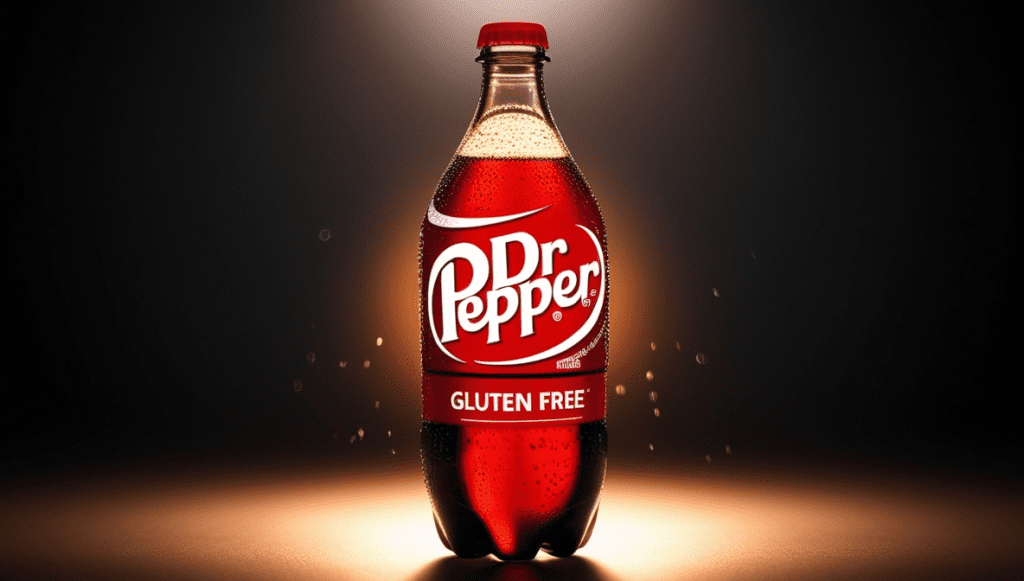Yes, Dr. Pepper is considered gluten-free. According to the Dr. Pepper website and various sources, all of their products are made without gluten-containing ingredients, making them safe for individuals with celiac disease or gluten sensitivity. Here’s a detailed overview based on the information available:
Gluten-Free Status of Dr. Pepper
- Ingredients: Dr. Pepper and its various flavors (such as Dr. Pepper Cherry, Dr. Pepper Zero Sugar, and Caffeine-Free Dr. Pepper) do not contain any gluten ingredients like wheat, barley, or rye.
- Official Statement: The company explicitly states that “all of our products are considered gluten-free,” which includes their full range of beverages.
- Varieties: Gluten-free varieties include:
- Dr. Pepper
- Dr. Pepper and Cream Soda
- Dr. Pepper Made with Sugar
- Dr. Pepper Cherry
- Dr. Pepper Zero Sugar
- Caffeine-Free versions
Cross-Contamination Concerns
While Dr. Pepper is labeled gluten-free, it’s important to note that:
- Cross-Contamination Risk: Although the ingredients are gluten-free, there may be a risk of cross-contamination during manufacturing, especially if produced in facilities that also handle gluten-containing products.
- Sugar Processing: Some concerns exist regarding high fructose corn syrup and sugar processing methods, which may involve bone char; however, this does not pose a risk for gluten.

Are There Any Dr. Pepper Flavors That Might Contain Gluten?
No, all varieties of Dr. Pepper are considered gluten-free. According to the Dr. Pepper website and various sources, including Celiac.com, all products under the Dr. Pepper brand do not contain gluten ingredients. This includes popular flavors such as:
- Dr. Pepper
- Dr. Pepper Cherry
- Dr. Pepper Vanilla
- Dr. Pepper Zero Sugar
- Caffeine-Free Dr. Pepper
However, it is important to note that while the ingredients themselves do not contain gluten, there may be concerns regarding cross-contamination during manufacturing.
How Does Dr. Pepper Ensure Its Products Are Gluten-Free?
Dr. Pepper ensures its products are gluten-free by:
- Ingredient Sourcing: The company uses ingredients that do not contain gluten, such as carbonated water, high fructose corn syrup, and natural and artificial flavors.
- Quality Control: The production processes are designed to avoid gluten contamination, although they do not specifically certify their products as gluten-free.
- Transparency: The company provides clear information on its website stating that all their products are considered gluten-free, which helps consumers make informed choices.
Symptoms of Gluten Intolerance from Consuming Gluten-Free Products
While gluten-free products are designed for those with celiac disease or gluten sensitivity, symptoms can still arise if a product is contaminated with gluten or if an individual has a different intolerance or allergy. Common symptoms of gluten intolerance include:
- Bloating and gas
- Diarrhea or constipation
- Fatigue
- Headaches
- Joint pain
- Skin rashes (such as dermatitis herpetiformis)
If someone experiences symptoms after consuming a product labeled gluten-free, it may be due to cross-contamination or other food sensitivities.
How Do I Know If a Product Contains Corn Gluten?
Corn gluten is a protein found in corn and is different from the gluten found in wheat, barley, and rye. To determine if a product contains corn gluten:
- Read Labels: Look for “corn gluten” specifically listed in the ingredient list.
- Check Allergen Statements: Some products may indicate potential allergens or cross-contamination risks on their packaging.
- Contact the Manufacturer: If you have concerns about a specific product containing corn gluten, reaching out to the manufacturer directly can provide clarity.
In summary, Dr. Pepper is generally safe for those following a gluten-free diet as it does not contain gluten ingredients and is officially labeled as gluten-free by the manufacturer. However, individuals with severe sensitivities should consider potential cross-contamination risks when consuming any processed food or beverage. Always check labels and consult with the manufacturer if you have specific concerns about gluten exposure.





